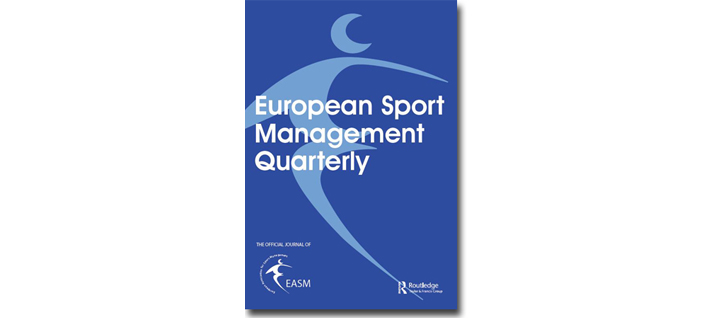
09 Nov ESMQ: Call for Papers 2018 Special Issue (18.1)
CALL FOR PAPERS
ESMQ 2018 Special Issue (18.1)
Managing High Performance Sport
As nations become more strategic in the way they produce elite athletes, sport systems move beyond the mere application of sport sciences, facilities and coaching as a sole base for elite athlete success. There is compelling evidence to suggest that the ‘new’ point of difference and competitive advantage for nations is effective management and governance of high performance sport (HPS). HPS and its management is a rapidly expanding profession in many countries around the world, one that continues to grow in size and sophistication. Although the number of athletes represented at this level of performance is marginal compared to the overall population, the number of stakeholders involved with high performance sport (e.g., specialising coaches, team directors, performance managers, administrators, sport agencies, sport organizations, individuals and beneficiaries, sponsors and media, governments and government agencies at all levels, academics and researchers, facility managers, team owners, athlete agents, sports and other scientists) is increasingly expanding to an industry that is becoming largely compound. Although the field of sport management has been widely defined, this relatively newly emerged concept of managing HPS is in its infancy and its characteristics are far from clear. As the discipline of sport management matures, HPS management emerges as a swiftly developing branch of knowledge. However, shifts in industry practices (i.e., hiring high performance directors and placing an emphasis on HPS management practices) have not been matched with an equivalent focus of academic inquiry that would help define the field, distinguish it from other fields and illustrate its significance in empirical ways. As Sotiriadou and De Bosscher (2013) outline in the Funnel of Managing High Performance Sport Framework, the factors that contribute to international sporting success can be explored within (a) the broader environment and elite policies around HPS (i.e., macro), (b) HPS management at an organisational/sport policy level (i.e., meso) (c) managing high performance athletes and the processes that would attract, retain/transition and nurture athletes (i.e., micro), and (d) specific pressures from media, sponsors, society, coaches, peers and family in the fast changing and highly volatile environment that HPS operates in. All these levels interact and increasingly influence the management of HPS. This complex nature of HPS reiterates the need to clearly conceptualise the research field in order to contribute theoretically and empirically to the sport management literature.
Aim of Special Issue
HPS is an all-encompassing umbrella term that is inclusive of social, managerial, economic marketing and even legal aspects of managing sport at the highest levels. Up until the 1970s and 1980s, in most countries, the typical elite sport system used to operate in a simple fashion where talented or elite athletes would train with a coach under the supervision or direction of the sports federations. This is now replaced with an ever increasing crew of experts (the HP team of experts) that work around the athlete and interact closely. Collins et al. (2013) refers to this evolution in the system as ‘the team around the athlete’ and explains how members of this team come together to guide and manage athletes. The aim of this special issue is to build on the existing research on the management of HPS and increase our understanding of the complexity of managing high performance within the context of sport. Furthermore, the issue aims to encourage submissions and critical analysis on existing research and broad-global theoretical approaches on ways elite sport is managed in sport systems/countries not as developed in their planning and processes as for example in Europe and Australia. The special issue welcomes submissions from a wide spectrum of elite sport and sport development including non-Olympic sports, professional style elite sport and team sports (e.g., baseball, American rugby), and
emerging sports that follow a different trajectory (e.g., peer coaching, self-testing, high levels of aesthetic focus over competitive outcomes).
Accordingly, the purposes of the special issue are: 1) to examine the current gaps in the management of HPS research worldwide; 2) to encourage new approaches that contribute to the conceptualisation of HPS; 3) to facilitate critical analysis on the management of elite sport in sport systems or countries not as developed in their planning and processes; 4) to examine a wide spectrum of sports and elite development processes; and 5) to set a research and management agenda for future development.
Examples of themes/sub-themes
Contributors may come from any social or human science discipline; qualitative, quantitative and mixed method research approaches that would focus on the multidimensionality of the management of HPS are welcome. Specifically, we invite contributors to examine empirically and theoretically the following themes and subthemes:
• Governance, organisation and management of HPS in Olympic, non-Olympic, extreme or professional sports/teams
a. Centralisation and decentralisation of HPS and talent management
b. Managing elite athlete entourage
c. The public and private sector involvement with managing HPS
d. Managing the high performance team, coaches and athlete entourage
e. Emerging trends in organising HPS systems and policies
f. Developing HPS in countries with less developed sport systems
g. The roles of different stakeholders in managing HPS sport (e.g., coaches roles, HO directors, parents, sport development officers, volunteers, significant others)
h. The roles of different sport organizations in managing HPOS (e.g., IOC, IFs, Olympic Committees, NSOs, clubs, academies, governments, government agencies, WADA, sport and recreation departments)
i. Managing high performance organisations
j. Managing teams in high performance
• Marketing and technologies in HPS
a. Managing elite athlete brand identity and image and sponsorships/endorsements
b. The ways new technologies influence the management of HPS
• Social issues in the management of HPS
a. Gender issues in the management of HPS (e.g., athlete and coaches equity and equality, country specific environments)
b. Ethics in managing HP sport
• Economic, legal and commercial aspects of managing HPS:
a. The commercialisation and professionalisation of HPS and of elite athletes and HPS in general
b. Resourcing, investing and offering value for money in HPS
c. Legal aspects on athlete contracts, transfers or exchanges
Call for the ESMQ 2018 Special issue (18.1)
Papers should be submitted in electronic format through Manuscript Central using the following link: http://mc.manuscriptcentral.com/resm; indicating you want the manuscript to be considered for Special Issue 18.1 [manuscripts in review process].
Proposed and Indicative Timeline:
March 20, 2016: Invitation to participate in the Special Issue Workshop @ the 24rd EASM 2016 Conference (Warsaw, Poland, 7-10 September 2016). This is an optional activity.
November 30, 2016: Submission deadline of full papers for consideration for the 2018 ESMQ Special Issue. Manuscripts in review process.
January 31, 2017: Feedback to authors
March 31, 2017: Return date for revised manuscripts
Second round of review process (if necessary)
May 31, 2017: Second revisions back from authors
Final decisions are made
Materials are prepared for final publication
July 15, 2017: Materials sent to Publisher
From this date onwards, the materials will be available for readers on iFirst
January 2018 publication of European Sport Management Quarterly, 18(1)
Guest editors
Dr. Popi Sotiriadou, Griffith University, Gold Coast, p.sotiriadou@griffith.edu.au
Dr. Veerle De Bosscher, Vrije Universiteit Brussel, vdebossc@vub.ac.be


